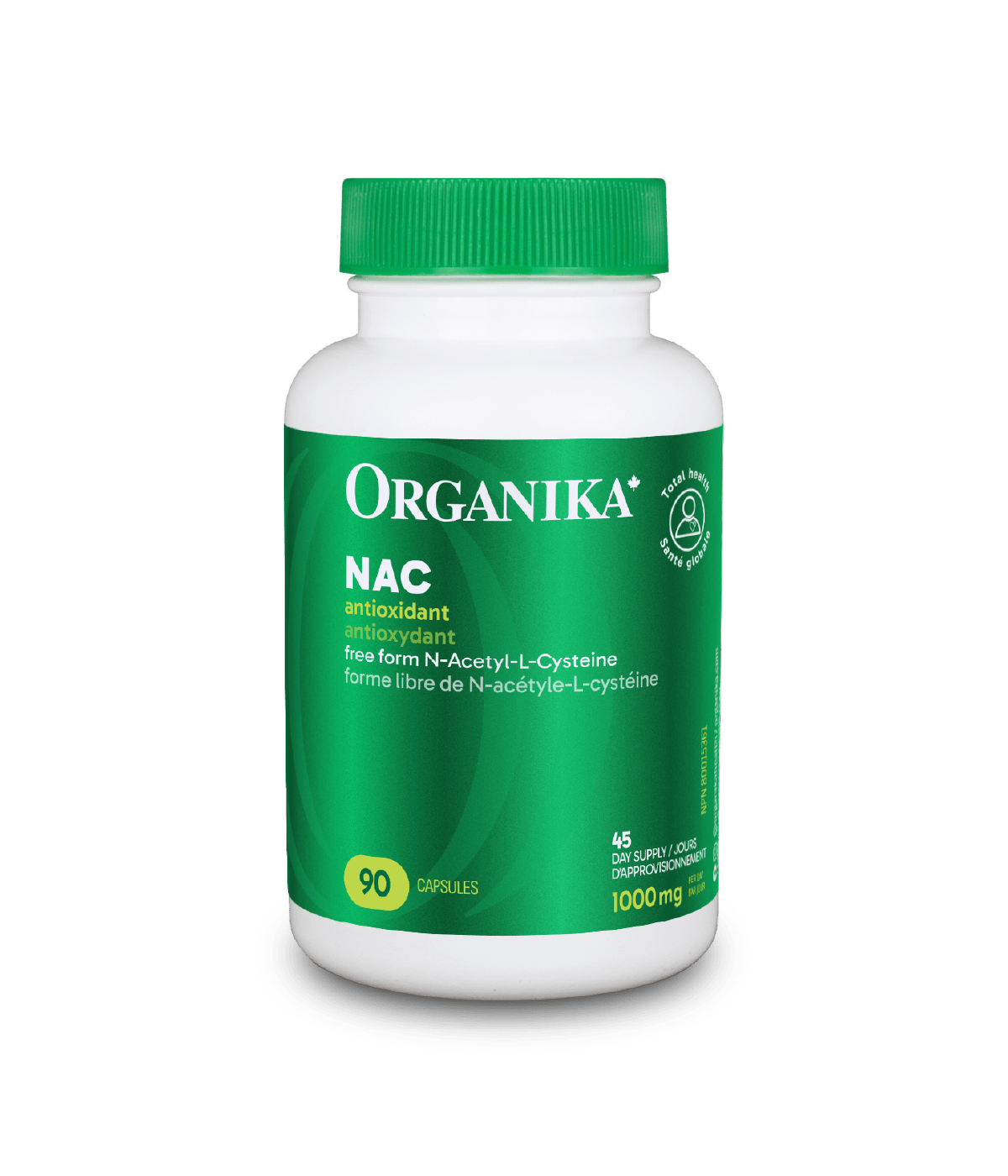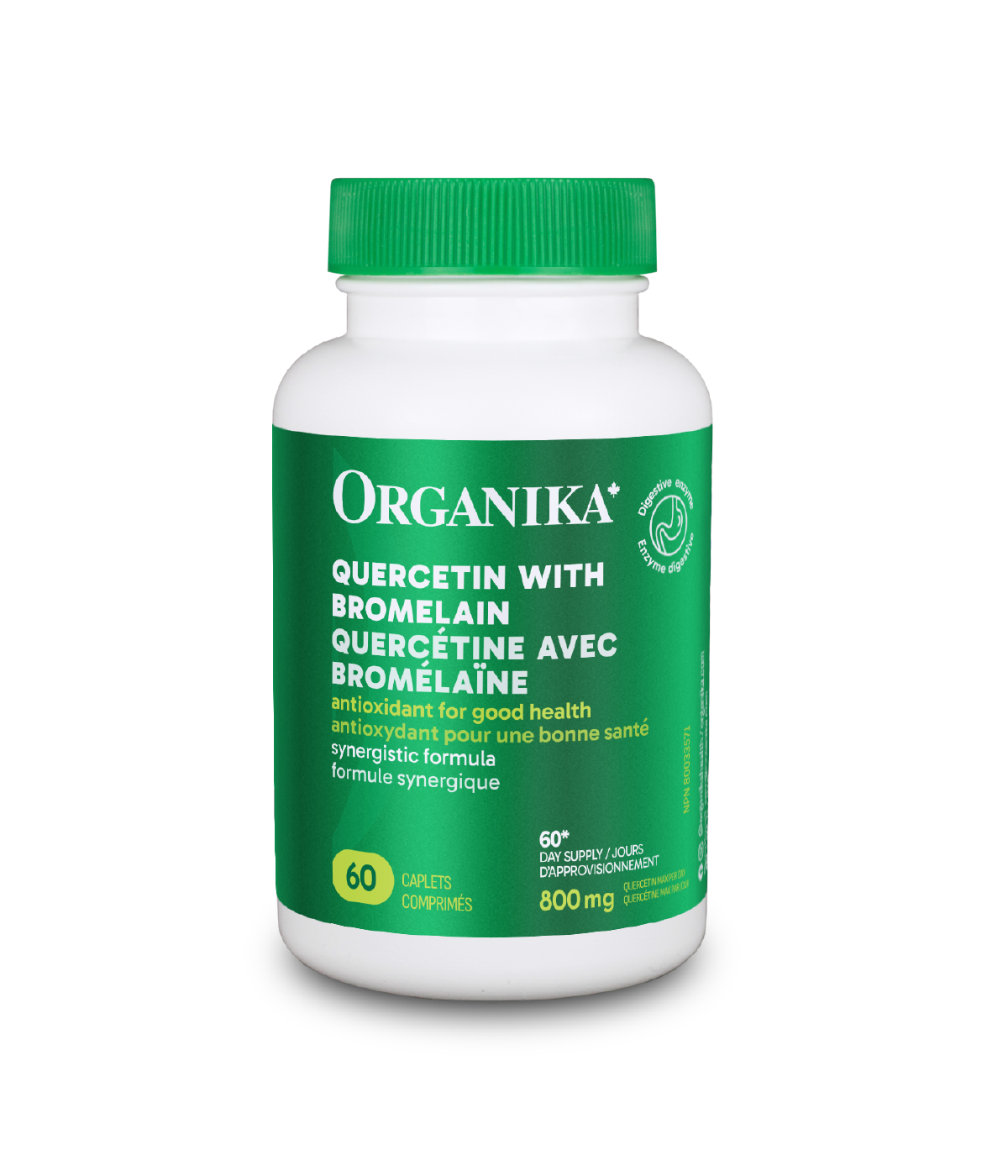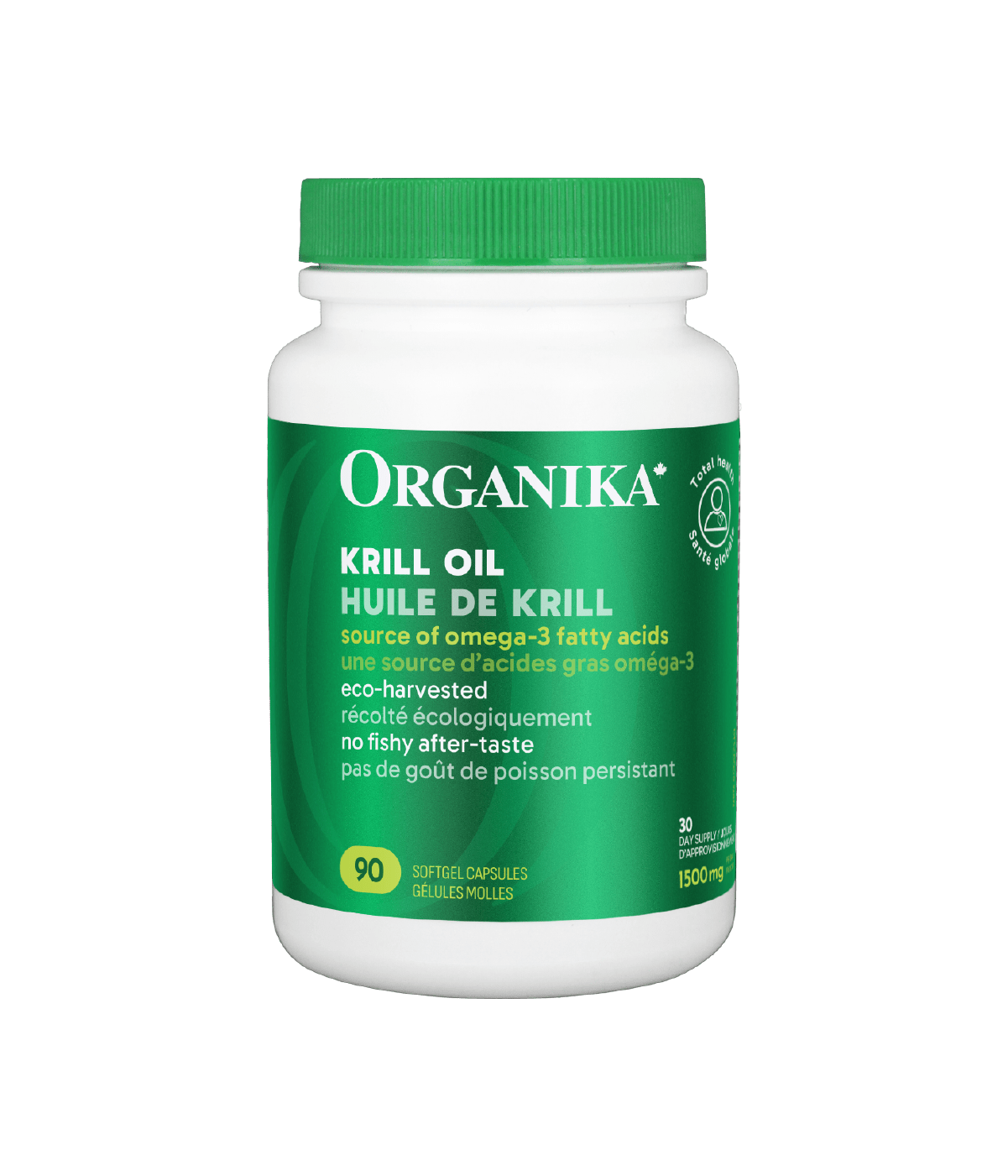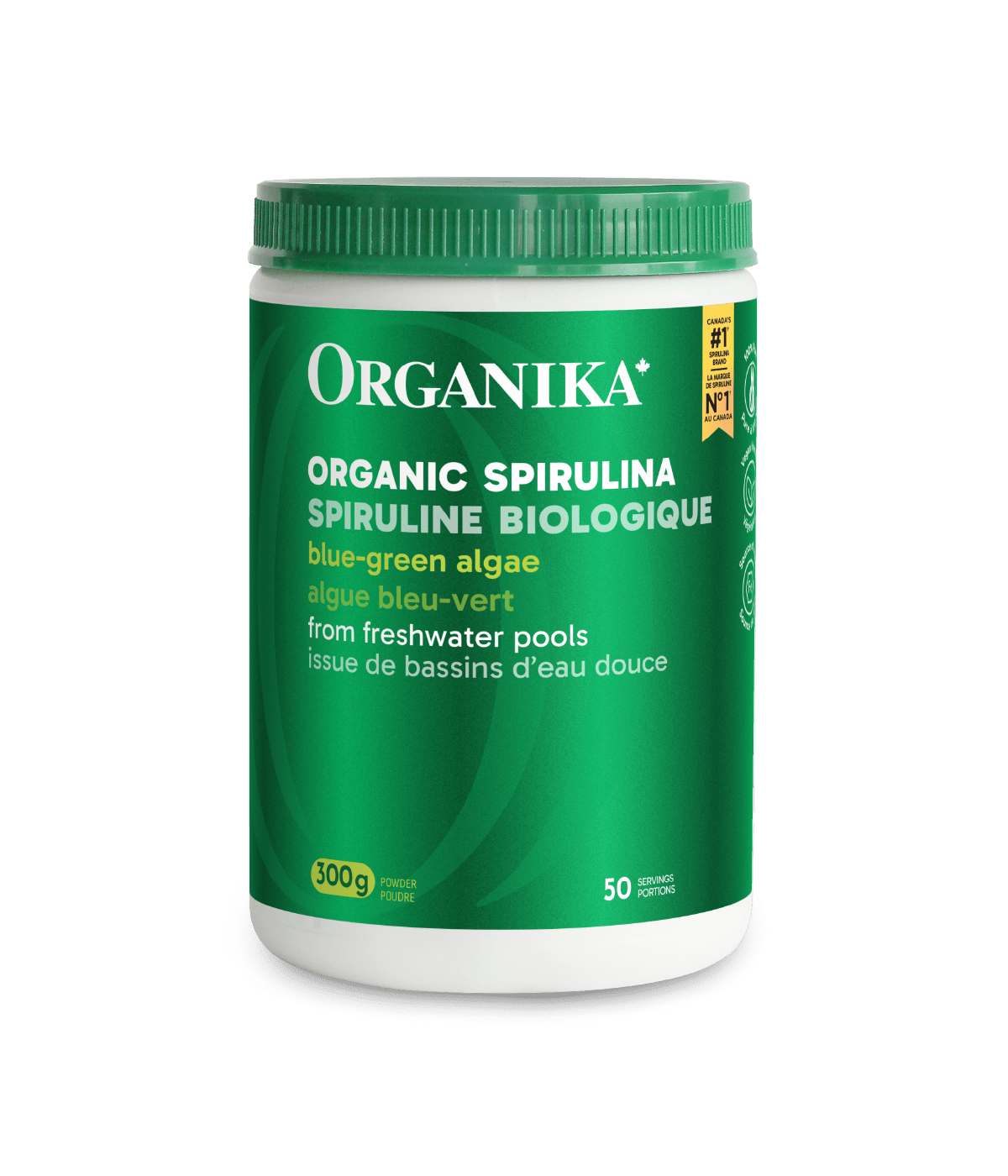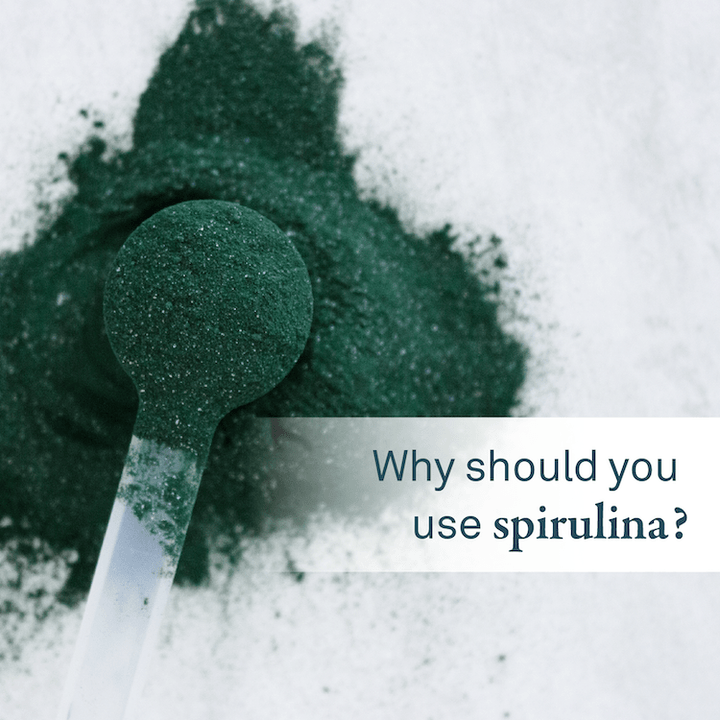







-
Is this right for you?

-


-


-

-

-

Liposomal Glutathione
A hightly absorbable form of Glutathione antioxidant to protect your cells
- Fights oxidative stress and helps reduce free radical damage
- Supports healthy skin and complexion
- Enhanced bioavailability for superior antioxidant support
- Supports detoxification and immune system resilience
Impossible de charger la disponibilité du service de retrait



Notify Me When Available
Enter your email and we'll let you know as soon as this product is back
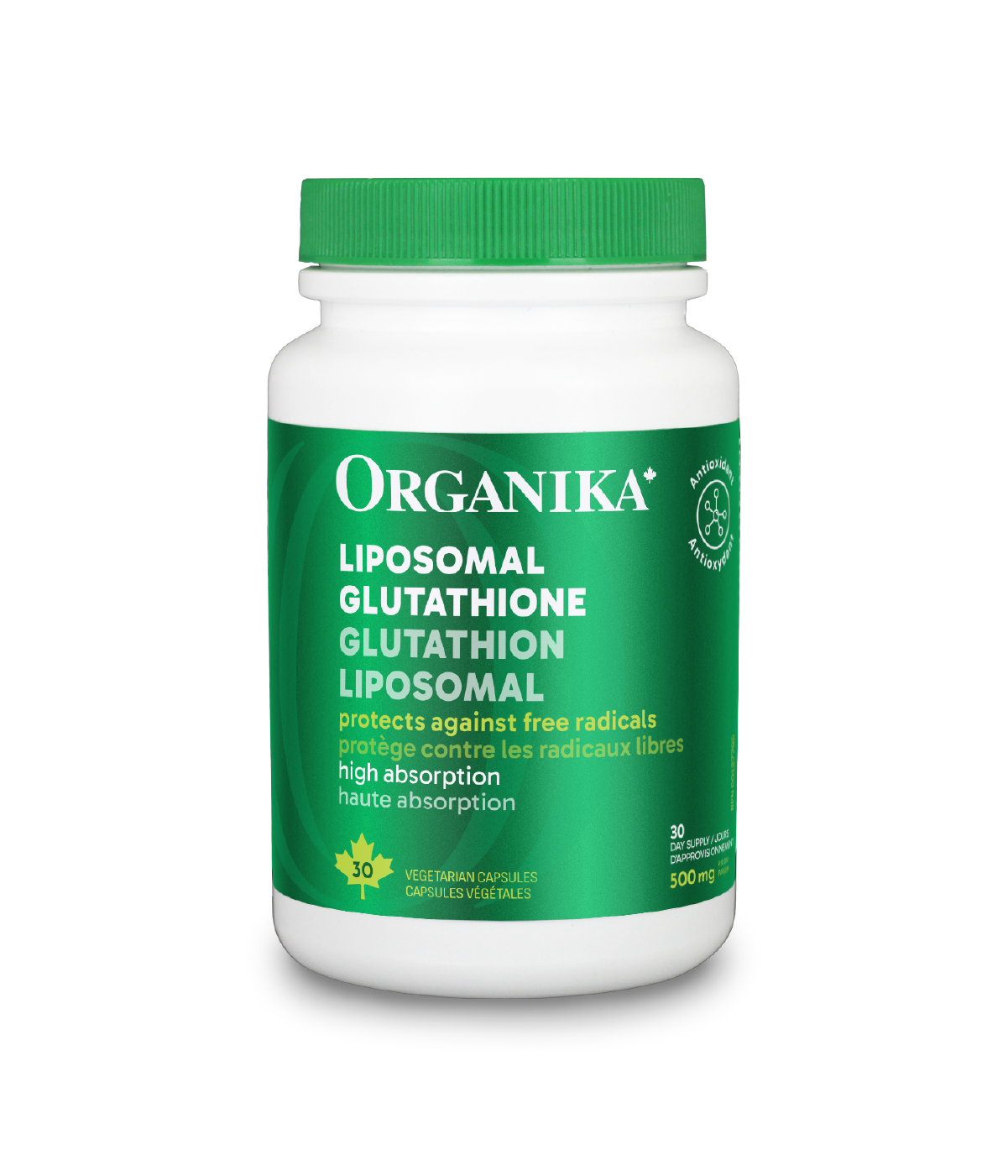
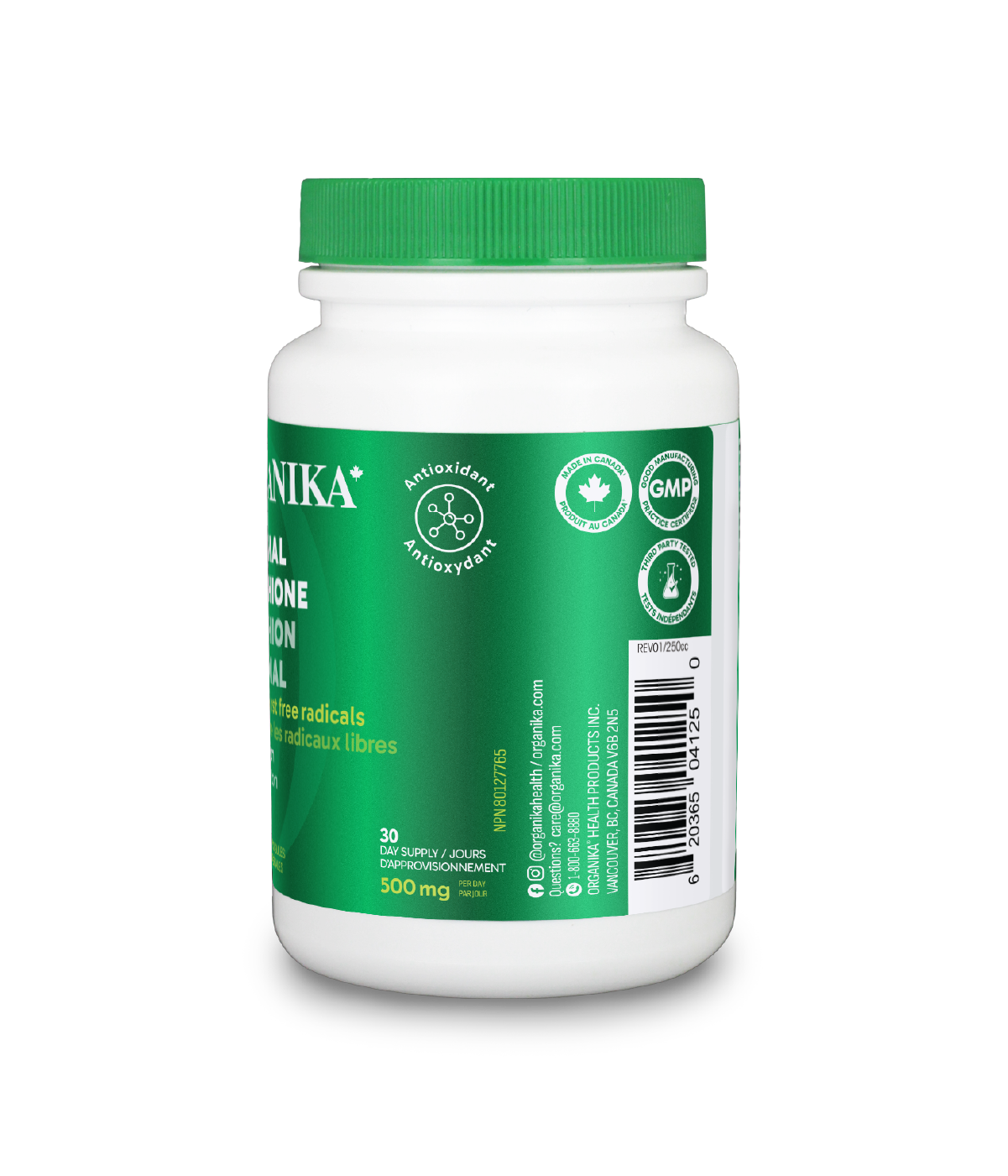
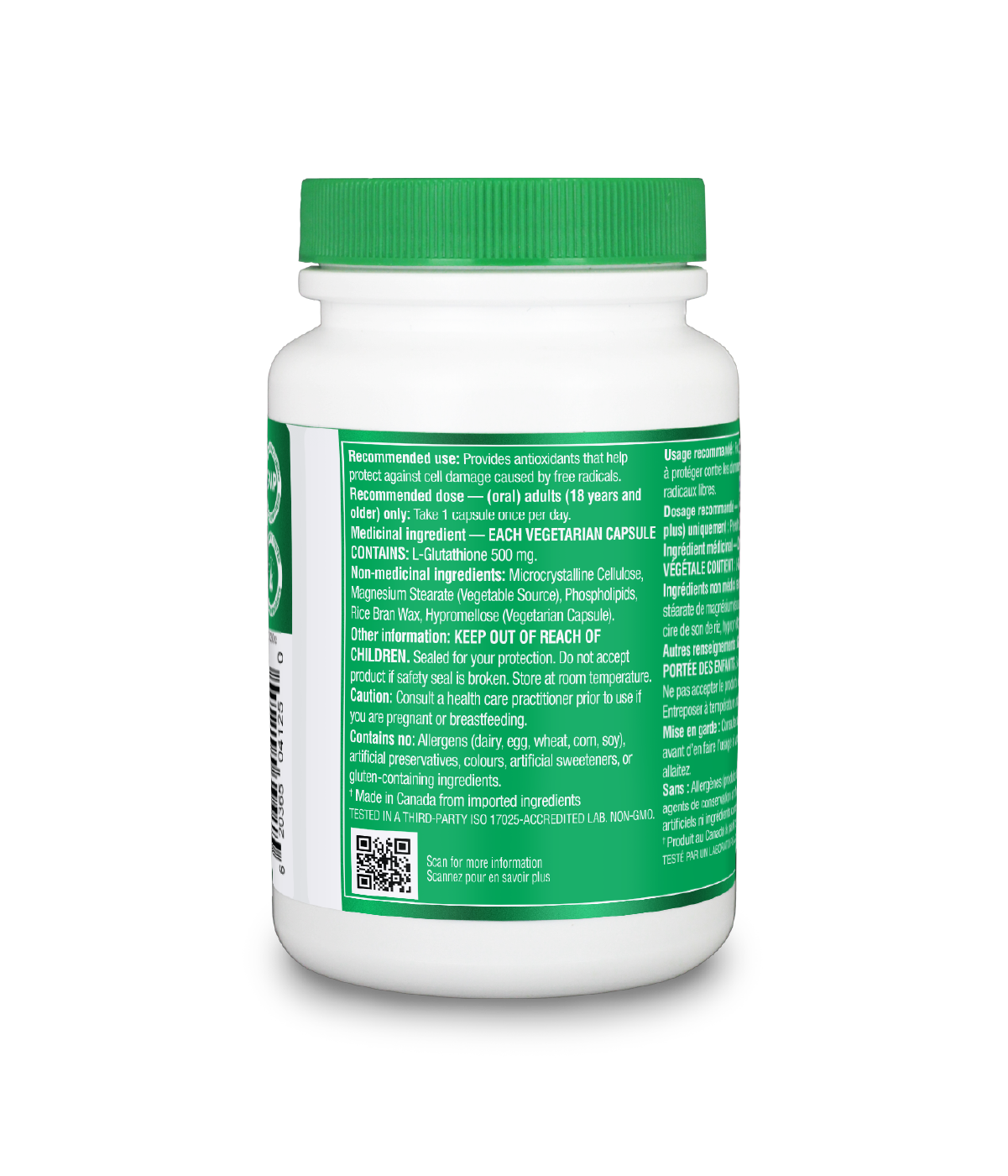
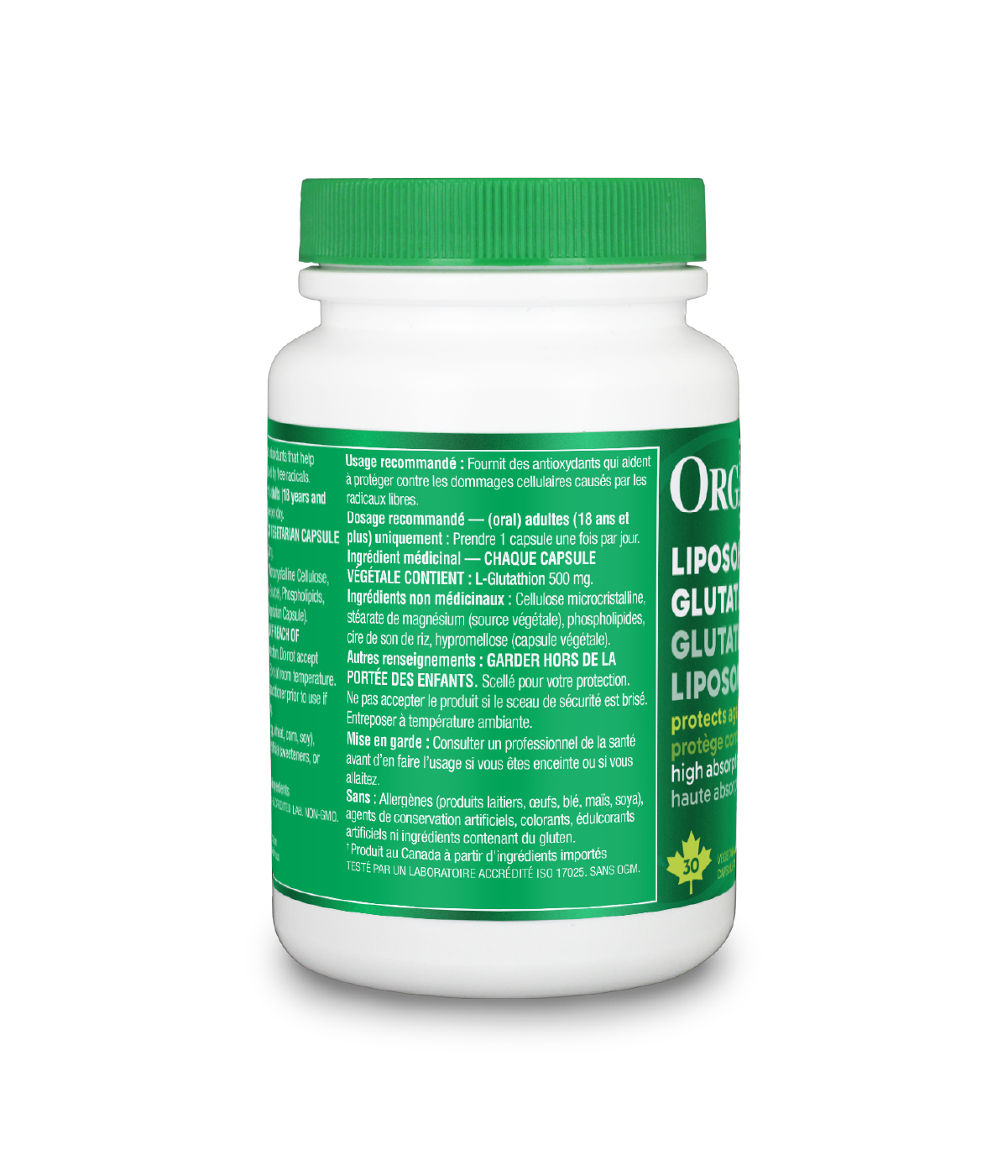




Supplement Facts




Ingredients & Nutrition
MEDICINAL INGREDIENTS: L-Glutathione 500 mg.
NON-MEDICINAL INGREDIENTS: Microcrystalline Cellulose, Magnesium Stearate (Vegetable Source), Hypromellose (Vegetarian Capsule).
How to Use: Take 1 capsule once per day.
Is This Right for You?
Are you looking for advanced antioxidant protection against daily stressors and pollution?
Do you want to support liver detox or recover from exposure to toxins?
Are you dealing with low energy, inflammation, or oxidative stress?
If you answered "Yes" to any of the above, this product is right for you.

-
Enhanced bioavailability for superior antioxidant support
-
Supports detoxification and immune system resilience
Ingredients & Nutrition
Recommend For
Are you looking for advanced antioxidant protection against daily stressors and pollution?
Do you want to support liver detox or recover from exposure to toxins?
Are you dealing with low energy, inflammation, or oxidative stress?
If you answered "Yes" to any of the above, this product is right for you.
Gluten-Free
Caffeine-Free
Keto Friendly
Non-GMO
Vegan Friendly
No Artificial Colours or Flavours
Liposomal Glutathione is an advanced, highly absorbable form of glutathione designed to defend your cells, detox your system and elevate antioxidant protection


The Full Scoop

-
Enhanced bioavailability for superior antioxidant support
-
Supports detoxification and immune system resilience
When it comes to detoxification, cellular defence and radiant health, glutathione is one of your body's MVPs. But not all forms absorb equally. That's where Liposomal Glutathione steps in. By encasing glutathione in tiny lipid bubbles called liposomes, this advanced formula helps deliver the antioxidant through your gut and directly into your cells without being broken down along the way. The result? Higher bioavailability, deeper detoxification and a stronger antioxidant shield against oxidative stress and environmental toxins.
Ask Away
We’ve got the FAQs covered. But if you’re still stuck, we’re only a message away.
Get in TouchWhat is Liposomal Glutathione?
Glutathione powder that is enclosed by a special protective layer, allowing for optimal absorption.
How is Liposomal Glutathione different from regular glutathione supplements?
Liposomal is a branded ingredient that has a special encapsulation technology that allows for better bioavailability.
What does Liposomal mean?
Liposomal is an encapsulating technology that is done to powders that help with shelf life as well as bio availability.
Can I take Liposomal Glutathione if I am pregnant or breastfeeding?
It is best to consult with a health care practitioner.
Are there any side effects associated with Liposomal Glutathione?
None
Is this product suitable for vegans and vegetarians?
Yes.
What is the source of the Phospholipids?
Sunflower
What is the rice bran wax and why is it included in this product?
Rice bran wax is the carrier source for the fatty acids.
You'll Likely Also Love...
NAC (N-Acetyl-L-Cysteine) Capsules
The foundation of cellular defence
Quercetin with Bromelain
The natural compounds that elevate your recovery through plant-based support
Krill Oil
Sustainably sourced and expertly crafted Omega-3 power
Organic Spirulina Powder
A nutrient-rich blue-green algae loaded with protein and iron
Support Beyond Products
The blue-green superfood has so many benefits for your skin and health. In 1974, the World Health Organization declared a type of algae as the “best food for the future” to combat malnutrition. Can you guess what it is? Spirulina. Spirulina is a powerhouse that has a wealth of health benefits - it supports your body’s natural detoxification pathways, aids in red blood cell production, is packed with antioxidants with anti-inflammatory benefits, and is an excellent source of iron and protein. Why I use spirulina Personally, I’m a big fan. You’ll find spirulina in my list of go-to smoothie ingredients along with nutrient-packed foods. Why? Packed with iron and protein Spirulina is highly concentrated in bioavailable iron and is one of the densest plant-based proteins in the world that contain all nine essential amino acids. One tablespoon (2g) of spirulina contains 4g of protein and 2mg of iron. Per gram, that is quite packed. This is a personal priority, since my monthly menstrual cycle, vigorous exercise and plant-centric diet put me at a higher risk for iron and protein deficiency. Spirulina is a convenient and tasty way to aid in red blood cell production and support muscle repair post-exercise. And when I recommend spirulina on top of a balanced diet to my clients, I can rest assured they’re receiving excellent nutritional benefits with just one small tweak. So much nutritional value for such a small yet mighty addition. Spirulina packs in antioxidants with anti-inflammatory benefits Phycocyanin is the main active compound in spirulina. Fun fact - it gives spirulina its blue green colour. Beyond that, it’s an incredibly potent antioxidant with anti-inflammatory properties. Phycocyanin reduces oxidative stress in your cells, by blocking out molecules that promote inflammation. Spirulina also has high amounts of naturally occurring chlorophyll Chlorophyll can help support the body’s natural detoxification pathways, namely through the liver. In fact, studies have linked chlorophyll to reduced incidence of liver cancer, and spirulina to improvements in fatty liver disease. Spirulina helps build a strong immunity Think of our immune system as an orchestra - it’s a complex network of systems, with each organ playing a specific role. They come together to produce a beautiful, strong symphony - the result is a strong body resistant to viruses and bacteria. Protein, iron, and antioxidants - these three nutrients in spirulina are powerhouses that work together to maintain a strong immunity. Furthermore, studies have found that the phycocyanins in spirulina help boost production of white blood cells and antibodies that help to fight viruses in your body. Spirulina helps reduce risk for chronic disease For those suffering from environmental allergies - good news: spirulina is shown in clinical studies to reduce symptoms of allergic rhinitis. For heart health, clinical studies have shown that 1-8g of spirulina daily can help reduce blood pressure. Another review found spirulina supplementation may help reduce fasting blood sugar levels in people with Type 2 diabetes. How to use spirulina You can take spirulina in tablet or powder form - whichever you prefer. If you like powder, Organika has a new super tasty option for you - they have taken the #1 Spirulina brand and fortified it with the power of B12, an essential vitamin needed for healthy blood cells and metabolism. Taste fruity tropical flavours while your cells rejuvenate and your whole health improves. Here’s some ways you can enjoy it: Add it to smoothies, mix into oatmeal, congee or porridge Prefer a hot beverage? Add it to your lattes or mix into teas. Salad dressings and green pasta sauces Mix it into homemade energy balls Enjoy! References: Cingi C, Conk-Dalay M, Cakli H, Bal C. The effects of spirulina on allergic rhinitis. Eur Arch Otorhinolaryngol. 2008 Oct;265(10):1219-23. doi: 10.1007/s00405-008-0642-8. Epub 2008 Mar 15. PMID: 18343939. Ferreira-Hermosillo A, Torres-Duran PV, Juarez-Oropeza MA. Hepatoprotective effects of Spirulina maxima in patients with non-alcoholic fatty liver disease: a case series. J Med Case Rep. 2010 Apr 7;4:103. doi: 10.1186/1752-1947-4-103. PMID: 20370930; PMCID: PMC2861069. Finamore A, Palmery M, Bensehaila S, Peluso I. Antioxidant, Immunomodulating, and Microbial-Modulating Activities of the Sustainable and Ecofriendly Spirulina. Oxid Med Cell Longev. 2017;2017:3247528. doi: 10.1155/2017/3247528. Epub 2017 Jan 15. PMID: 28182098; PMCID: PMC5274660. Fooddata Central Search Results. FoodData Central. (n.d.). https://fdc.nal.usda.gov/fdc-app.html#/food-details/170495/nutrients García JL, de Vicente M, Galán B. Microalgae, old sustainable food and fashion nutraceuticals. Microb Biotechnol. 2017 Sep;10(5):1017-1024. doi: 10.1111/1751-7915.12800. Epub 2017 Aug 15. PMID: 28809450; PMCID: PMC5609256. Grover P, Bhatnagar A, Kumari N, Narayan Bhatt A, Kumar Nishad D, Purkayastha J. C-Phycocyanin-a novel protein from Spirulina platensis- In vivo toxicity, antioxidant and immunomodulatory studies. Saudi J Biol Sci. 2021 Mar;28(3):1853-1859. doi: 10.1016/j.sjbs.2020.12.037. Epub 2020 Dec 30. PMID: 33732072; PMCID: PMC7938138. Hatami E, Ghalishourani SS, Najafgholizadeh A, Pourmasoumi M, Hadi A, Clark CCT, Assaroudi M, Salehi-Sahlabadi A, Joukar F, Mansour-Ghanaei F. The effect of spirulina on type 2 diabetes: a systematic review and meta-analysis. J Diabetes Metab Disord. 2021 Mar 2;20(1):883-892. doi: 10.1007/s40200-021-00760-z. PMID: 34178867; PMCID: PMC8212345. Machowiec P, Ręka G, Maksymowicz M, Piecewicz-Szczęsna H, Smoleń A. Effect of Spirulina Supplementation on Systolic and Diastolic Blood Pressure: Systematic Review and Meta-Analysis of Randomized Controlled Trials. Nutrients. 2021 Aug 31;13(9):3054. doi: 10.3390/nu13093054. PMID: 34578932; PMCID: PMC8468496. Mazokopakis EE, Papadomanolaki MG, Fousteris AA, Kotsiris DA, Lampadakis IM, Ganotakis ES. The hepatoprotective and hypolipidemic effects of Spirulina (Arthrospira platensis) supplementation in a Cretan population with non-alcoholic fatty liver disease: a prospective pilot study. Ann Gastroenterol. 2014;27(4):387-394. PMID: 25331487; PMCID: PMC4188938. Naeini F, Zarezadeh M, Mohiti S, Tutunchi H, Ebrahimi Mamaghani M, Ostadrahimi A. Spirulina supplementation as an adjuvant therapy in enhancement of antioxidant capacity: A systematic review and meta-analysis of controlled clinical trials. Int J Clin Pract. 2021 Oct;75(10):e14618. doi: 10.1111/ijcp.14618. Epub 2021 Aug 4. PMID: 34235823. Nourollahian M, Rasoulian B, Gafari A, Anoushiravani M, Jabari F, Bakhshaee M. Clinical comparison of the efficacy of spirulina platensis and cetirizine for treatment of allergic rhinitis. Acta Otorhinolaryngol Ital. 2020 Jun;40(3):224-229. doi: 10.14639/0392-100X-N0139. PMID: 32773785; PMCID: PMC7416373. Sayin I, Cingi C, Oghan F, Baykal B, Ulusoy S. Complementary therapies in allergic rhinitis. ISRN Allergy. 2013 Nov 13;2013:938751. doi: 10.1155/2013/938751. PMID: 24324897; PMCID: PMC3845706.
read moreFrom baby to adult, probiotics are necessary for good health. There are a lot of buzzwords surrounding the gut microbiome, many of which can be confusing to navigate. The one fundamental piece is the role those good bacteria or ‘probiotics’ plays in our overall health and wellbeing. Let’s Talk Microbiome Research is exploding with new information about how our gut’s function extends far beyond digestion, affecting things like mental health and mood, immune health, cardiovascular health and weight management to name a few. Think of your microbiome as an entire ecosystem. A community of microorganisms including bacteria, located mainly in your intestines, that play an enormous role in our overall health. These bacteria help with digestion of our food and nutrients, but we are learning that their role extends far beyond that. Did you know... It is estimated that roughly 40 trillion bacterial cells and up to 1,000 different species of bacteria are found in the gut and make up 1-3% of our overall body weight. (2-6lbs!) Probiotics Are Good Bacteria Probiotics are ‘good bacteria’ that are important at every stage of life. By incorporating these into your diet or supplement routine, you help keep ‘bad bacteria’ at bay. The microbiome develops early on and continues to diversify as we age. There are many ways to shape the diversity of our beneficial bacteria including the following 9 points. Eat a diverse range and variety of food. Higher microbiome diversity is considered better for overall health. In particular, fibrous foods like legumes, whole grains, fruit, and vegetables. Eat fermented foods. Think sauerkraut, tempeh, kombucha and kefir. These live bacterial cultures will restore gut flora and prevent an overgrowth of the bad bacteria. Eat prebiotic foods. This type of fiber will stimulate the growth of healthy bacteria. Think artichokes, banana, apple, oats and asparagus Eat whole grains. Not only do they contain a lot of fiber, but beneficial carbs like beta glucan which are digested by the gut bacteria, help benefit weight, cancer risk, and diabetes. Eat foods rich in polyphenols. Plant compounds in wine, green tea and dark chocolate are broken down by the gut to produce healthy bacterial growth Get tested for food sensitivities. Foods that your body can’t digest, further contribute to underlying inflammation. Stress management (think acid reflux, ulcers) Exercise regularly! Supplement with excellent quality probiotics. Everyone Needs Probiotics at Any Age Babies, children, and adults can all benefit from a good quality probiotic. By adding a probiotic into your daily routine, you continue to help create a strong gut flora. This in turn, strengthens the immune system and contributes to overall health. For Little Ones For babies, probiotic drops are recommended, as they are easy to add to a bottle or simply in the mouth directly... Organika has one with Vitamin D - Baby Probiotic Drops with Vitamin D. Kids can enjoy Probiotic Chewable Tablets, and adults can benefit from both a Probiotic + Prebiotic Powder. It is never too late to incorporate a good probiotic into your supplement routine if you haven’t already started. To support diversity of bacteria, I also look for a multi-strain probiotic, meaning there are many sources of good bacteria. You can achieve health for the whole family, simply by taking care of your gut flora.
read moreIs there a certain time in your life to consider taking collagen daily? Collagen, a pivotal protein in our body, supports various aspects of our health, including skin vitality, joint functionality, and muscular strength. Let's explore when to consider collagen supplementation and its myriad of benefits. As a Naturopathic Doctor, I often engage with patients curious about what collagen supplementation entails, what the benefits are, and why it might be right for them. Ultimately the age you start is up to you, but knowing when collagen starts to decline in the body may help you choose when to start. The Onset of Collagen Decline Our body's collagen production typically begins to diminish in our mid-20s, accelerating around age 40, and significantly drops by our 60s. This natural reduction in collagen affects not only our physical appearance, such as decreased skin elasticity, but also the functional integrity of our joints and muscles. Understanding Collagen Production Decline Collagen’s reduction impacts the body's structural support, manifesting in changes in skin texture, joint discomfort, and a decrease in muscle mass. It's not just a cosmetic concern; it's a matter of maintaining bodily strength and mobility. Joint stiffness, reduced mobility, and an overall decrease in muscle strength, are common concerns as we age, and can impact our bodies ability to withstand injury. Research has shown that this decline is due to both intrinsic aging processes and environmental factors like UV exposure and pollution (Shuster et al., 2005). Delving into the Science of Collagen Supplements Research highlights the effectiveness of collagen supplements in addressing these age-related changes. For instance, a study published in 2019 demonstrated how collagen peptides improve skin hydration and elasticity (Bolke et al., 2019). This study highlighted that regular intake of collagen led to noticeable improvements in skin moisture and elasticity, suggesting its potential as a proactive measure against aging. Another study in 2021 highlighted collagen's role in promoting muscle mass and reducing joint pain in individuals across a wide range of ages (Khatri et al., 2021). These findings are significant as they illustrate that hydrolyzed collagen, which is more readily absorbed by the body, can significantly replenish depleted collagen levels, improving many aspects of health, from skin appearance to joint and muscle function. Naturopathic Recommendations on Collagen Intake In my practice, I recommend considering collagen supplementation around the age of 25 to 30. This proactive approach can support not only skin health but also joint functionality and muscle mass, contributing to overall well being. When advising patients, I consider their dietary patterns and overall health profile. Products like Enhanced Collagen Original by Organika is often my go-to recommendation due to ease of incorporation into daily routines and being an excellent source of protein. For pescatarians, Marine Collagen Powder by Organika is a suitable alternative. These supplements can easily be added to morning smoothies, oatmeal, coffee and even water. I recommend a holistic approach to health As always, a holistic health strategy is paramount, and collagen supplements should be part of a balanced lifestyle inclusive of a nutritious diet and regular exercise. Consultation with a healthcare professional before beginning any new supplement regimen is essential to ensure it aligns with individual health needs and goals. In conclusion, understanding the onset of collagen decline and its effects is crucial for maintaining overall health and wellbeing. With the right knowledge and approach, collagen supplementation can be an effective tool in managing the signs of aging and supporting the body's structural integrity. In health, Dr. Courtney Clayson-Russell
read more





